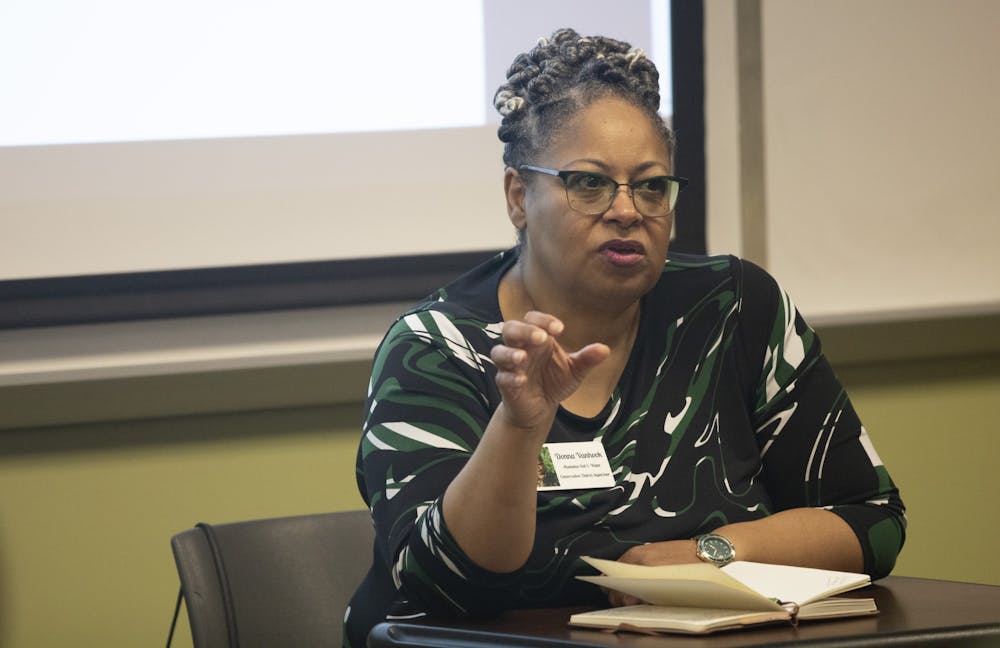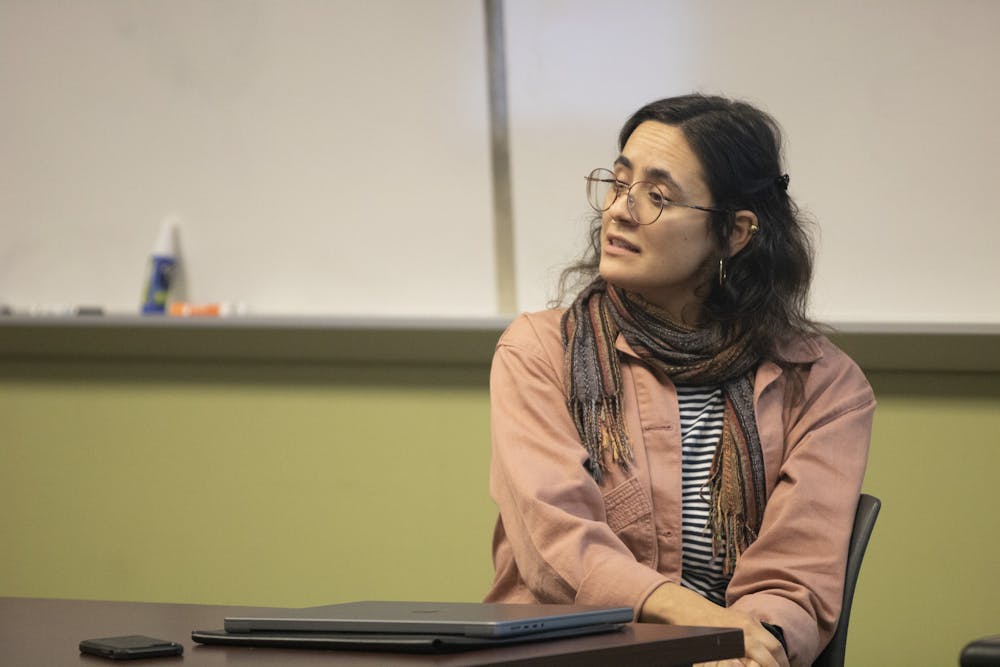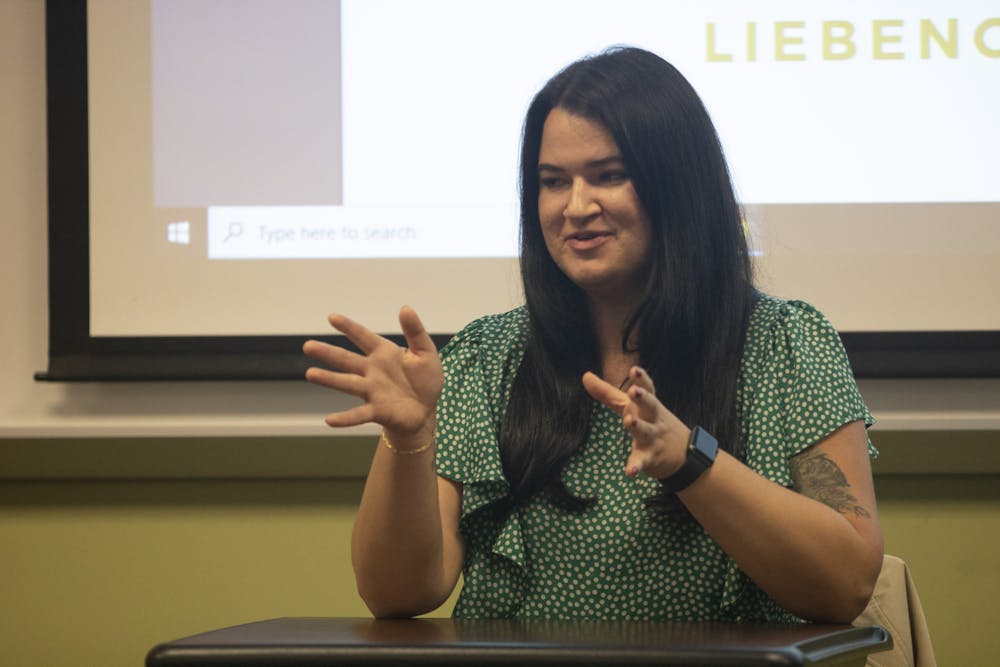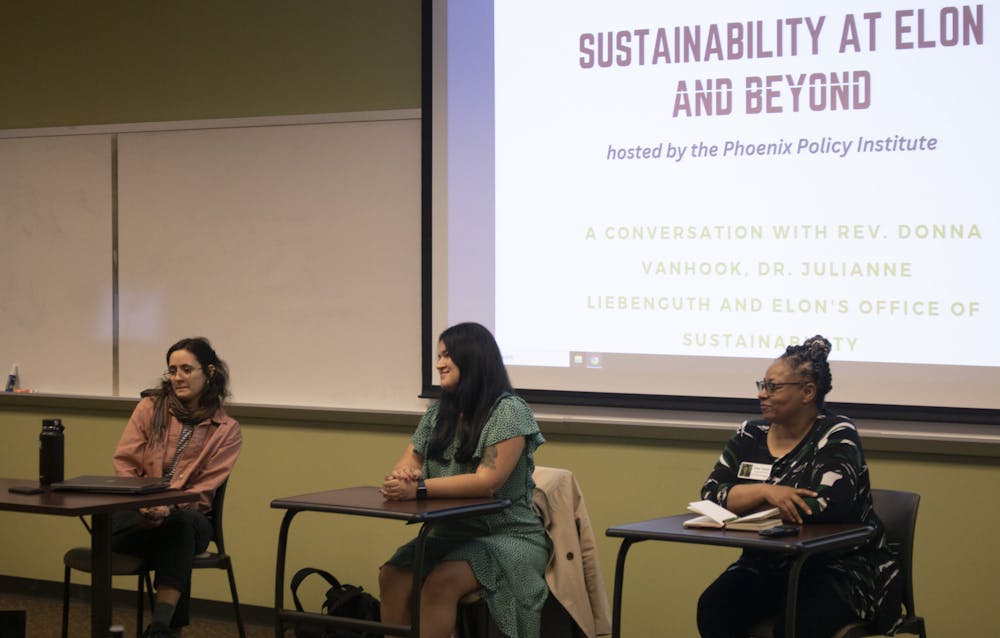Kelly Harer, Elon University’s associate director of sustainability for education and outreach, said she originally planned to combat sustainability injustice as an environmental lawyer. According to Harer, when she quickly realized that she couldn’t argue for a living, she realized her talent and passions better serve her as an educator.
Harer said the best way Elon students can get involved in sustainability efforts is for them to find what they’re good at and follow what they’re passionate about.
“We need good writers, we need good photographers, we need people who are really into data. Figuring out what you're really good at and how that can be of help is really important,” Harer said. “Especially as Elon students, I don't think y’all really understand the power that you have.”
Elon’s Phoenix Policy Institute is a student-led organization that produces policy research and provides professional learning experiences for undergraduates, according to its website.
On Nov. 7, PPI hosted a sustainability discussion where Harer, the Rev. Donna Vanhook ’07 — Alamance County’s soil and water conservation district supervisor — and professor of political science and policy studies Julianne Liebenguth spoke to nearly a dozen students about barriers to sustainability at Elon and in the community.
In addition to being an alumna, Vanhook is a community partner with Elon and the first Black woman to hold her position in county office. She said the biggest barriers to sustainability and environmental communication in the community are race and policy. To illustrate this idea, Vanhook began the discussion by defining the concept of womanism, which involves the intersection of race, gender and class into matters such as environmental injustice, and explained how her identity as a Black woman impacts how she sees and tackles community issues.

The Rev. Donna Vanhook ’07, Alamance County’s soil and water conservation district supervisor, talks to Elon's Phoenix Policy Institute about the barriers of race and policy in addressing community sustainability efforts on Nov. 7 in Lindner Hall.
“I'm the first woman — first Black woman — to ever hold this office. And so I'm trying to set a precedent for how maybe the next woman or the next person who is elected can approach this in a proactive way,” Vanhook told Elon News Network. “Environmentally for Black and brown communities, I think more can be done — but it's just not being done because people's lives are not taken seriously.”
The most prominent issue and example brought up during the discussion were the long-standing environmental impacts of the former Western Electric Company-Tarheel Army Missile Plant.
According to Vanhook, the former missile plant has polluted predominantly Black neighborhoods for over 30 years — creating a difference in life expectancy of up to 11 years shorter just four miles away from Elon. Vanhook said the best thing that students and community members alike can do is to educate others and spread the word.
“The more people we can get on hand that are saying something needs to be done about that, the more response we can get from the federal government and army to say yes we need to get on this right away,” Vanhook said during the discussion. “We have to think about the bottom line: Who's been affected that lives there every day? Young people, older people, just people in general — but essentially, it's Black and brown people. That's what it boils down to.”
Liebenguth added to this concept by examining sustainable development on a global scale.
“In my environmental security course, we think about sustainability as an inherently political concept, as a negotiated concept and a deeply contested concept,” Liebenguth said in the discussion. “Not everyone is happy with this notion of sustainable development globally. Particularly countries in the global South, argue that this is just another technique for affluent, industrialized countries to steer global governance in their favor.”

Julianne Liebenguth, Elon professor of political science and policy studies, discusses the complexities of sustainable development on a global scale with the Phoenix Policy Institute on Nov. 7 in Lindner Hall. Liebenguth emphasized that not everyone worldwide is happy with the idea of sustainable development, as some countries see it is as a technique for more affluent, industrialized countries to steer global governance in their favor.
Both on a global and community scale, Liebenguth said sustainability needs to go hand-and-hand with justice, equity and power dynamics.
“This is a matter of justice and equity,” Liebenguth said. “Embrace the normative commitment to engaging with environmental politics as fundamentally a matter of equity and matter of power and justice.”
As for Elon University’s role in local sustainability, Harer reviewed Elon’s sustainability master plan. First launched in 2007, the office of sustainability updates the plan every 10 years. Once the 2015 update expires at the end of 2024, the university will follow a new plan from 2025 to 2035.
According to Harer, one aspect of saving energy that the university plans to continue as it continues to expand over the next 10 years is timed and selective heating and cooling systems. With heating and cooling turned off in all academic buildings from 7 p.m. to 7 a.m., there are also currently 250 spaces on campus, such as Sankey Hall, that allow students or faculty to heat or cool individual rooms upon reserving the spaces between the shut off time frame. With more buildings on the way, Harer said this feature will be built into new spaces.
Yet, Harer said waste reduction is something the university continues to struggle with — having estimated that only 20% of Elon’s current waste is being recycled. According to Harer, Elon’s goal is to keep 50% of its waste away from landfills by 2030. To help push this initiative forward, Harer pointed to the hiring of a waste reduction and recycling manager last year.
Looking ahead, Harer also said the fast-paced landscape of sustainability has proven difficult to plan and set goals for 10 years in the future.
“Our first or second plan was maybe a little too specific, like a lot of the things that we talked about in 2015 aren't even around now. So I think we've learned a lesson around thinking bigger,” Harer said in the discussion. “Part of my job is to just let students know that these things are happening.”
Yet, one goal that Harer said Elon intends on bringing into the updated plan is to become carbon neutral — meaning the university offsets the amount of carbon it emits by making verified carbon offset purchases, such as planting trees.

Kelly Harer, Elon University’s associate director of sustainability for education and outreach, describes Elon's current goals and struggles carbon emissions, energy consumption and waste disposal on Nov. 7, 2023 in Lindner Hall. Elon's current sustainability master plan will expire at the end of 2024, paving the way for new goals for the 2025 to 2035 master plan.
With about half of Elon’s total carbon emissions coming from energy use, Harer also said Elon has begun making strides in offsetting students’ study abroad emissions. With roughly 80% of students going abroad at some point during their time at Elon, Harer attributed 18 to 24% of Elon’s total carbon emissions to study abroad trips every year.
To start combatting this, students can choose to register for the carbon neutral abroad program — which charges students for about 80% of a carbon offset purchase, with the Global Education Center paying the remaining 20%.
Wrapping up the event, Vanhook, Harer and Leibenguth emphasized the importance for Elon students to get involved in university and community environmental efforts. Most notably, recent efforts by local groups on a rights of nature campaign for Haw River in the wake of pollutants in the water.
By granting Haw River legal status, the state would be able to sue companies on behalf of the river before people get sick to bring litigation. According to Harer, while there are rights of nature legislation present all over the world, North Carolina is the first state to propose the initiative in the United States.
“As college students, it's difficult to get involved in the community. You are in the Elon bubble, We know Elon students are really, really busy. I think utilizing Elon, faculty, staff, alumni — we live in the community, right? So talking to faculty staff that you have relationships with is a really good way to get your foot in the door somewhere,” Harer said during the discussion. “Something I really love about Alamance County is a lot of these groups are working together — we're building communities.”
Director of the Phoenix Policy Institute senior Savannah Willette agreed, stating that the PPI hosts two events each semester with the primary goal of getting their research out to students and staff.
“Institutions like the Policy Institute are perfect ways for students to get informed on a variety of issues that impact our community,” Willette told Elon News Network. “Our purpose of the think tank is to bring these issues to Elon students.”
According to Dillan Bono-Lunn, professor of political science and policy studies and instructor of PPI, students can take the PPI course up to four times with no course prerequisites. Bono-Lunn also said they accept external contributors, who may submit any piece of policy-relevant work to their blog or research initiatives.
Bono-Lunn and Willette encourage students who are interested to email them at dbonolunn@elon.edu or swillette2@elon.edu.
“It's just about getting your foot in the door, and I think that's the hardest part,” Willette said. “Students coming to this event exposes them to all the different issues that are involved with environmental studies, and social advocacy and environmental justice. … Even if just one aspect of what they've obtained inspires them — that could lead to more opportunities and more involvement.”


